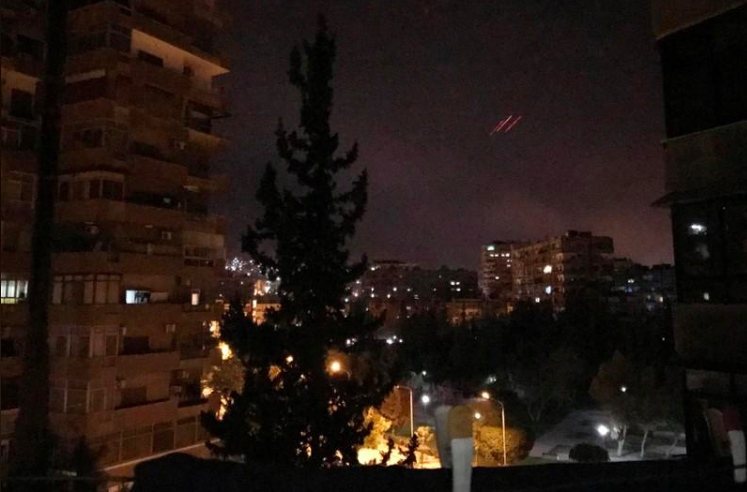Syria airstrikes: Why I find Iraq flashing before my eyes
So, it begins.
We've joined the US and France, in airstrikes against Assad's regime/the Syrian government (delete as your political stance makes applicable). Instead of a 4am knock on the door from the police, Syria got a 4am knock on the tarmac from an air-to-ground missile.

Maybe the words 'it begins' and 'airstrikes' fill you with relief? Finally, we're actually doing something – we're showing Assad that chemical weapons can't be used on his own people. Our leaders are standing firm and taking the moral high ground for once.
And PM Theresa May has promised this is not about regime change – or getting involved in the civil war in Syria. No, far from it. It's a limited strike that doesn't escalate the tensions in the region.
The thing is, despite the PM's reassurances, I find Afghanistan, Iraq and Libya flashing before my eyes. Do you? The optimism and righteous anger with which our politicians announced their plans for those countries. It always began for the good of the people. It always began to save them from the acts of their own leaders.
All these years on, how is daily life for civilians in Afghanistan, Iraq and Libya? Ask the people of the Nineveh Plains, who suffered atrocious acts at the hands of Islamic State – after the West's toppling of Saddam Hussein somehow failed to lead to immediate peace and prosperity. Weird, huh? Ask the refugees, preyed on by people-smugglers in Libya, now that the country is divided against itself. Ask the 2,258 civilian casualties, in the first quarter of this year alone, in Afghanistan.
In the last couple of weeks, I've been asking a lot of people about Syria – and what actually matters to the people there. The millions of internally displaced, and the more millions who've fled, to wretched conditions in refugee camps across the border.
Wynn Flaten heads up the children's charity World Vision in Jordan. They're hugely concerned that pupils still in school in Syria are suffering violence at home, in the streets and in the classroom. Isn't that tragic? If peace does come to Syria, they'll be the next generation of leaders and workers. Will they be too traumatised to rebuild trust and community?
Nadim Nassar was born in Syria, and now lives in the UK, where he founded the Awareness Foundation. They work across the world, helping educate people against intolerance, and empowering faith groups to embrace diversity and build peaceful and harmonious communities. He told me the Church in the West has failed Syria. He's calling on its leaders to stand up and ask hard questions of our leaders. And to challenge them to seriously push for ceasefires and peace talks in Syria.
Stephen Rand is an advocacy consultant to an All Party Parliamentary Group in Westminster. Previously, he's worked with the aid charity Tearfund and anti-persecution charity Open Doors. In 2013, Open Doors lobbied the UK not to get involved in Syria's civil war – because the Christian minority there were scared what would happen to them in a power-vacuum. Can I just flag up here that Islamic State still has a presence in Syria? Stephen told me that the West throwing bombs at a situation never solves it. He said he'd redouble his efforts to push for meaningful peace talks.
But it's begun. We've launched missiles against Syrian government targets. And some will echo the PM, saying 'we had no other options – it had to be done and it's good that we've done it'.
Interestingly, just a couple of weeks ago I spoek to John Stubbs, a spokesman for the US State Department. He told me the US would see the final eradication of Islamic State as a signal to withdraw from Syria. So presumably America hasn't drawn up a long-term roadmap to peace? When we look back at Afghanistan, Iraq and Libya – have we learnt nothing? John did assure me the Trump administration was pushing for ceasefires and peace talks at all opportunities. But I suspect it's harder to call for a ceasefire when you're launching missiles yourself.
And now it has begun, there are fears that it will escalate – despite the PM's reassurances. Jonathan Arnott, former treasury spokesman for UKIP and now an independent MEP, has been speaking out on social media. Overall, he thinks this weekend's airstrikes do have a clear goal – to limit Syria's production and use of chemical weapons. But he's worried. That this will drive Russia further into the arms of the Assad regime. That Iran will increase militia action, probably in the south, probably against Israel. And he asks will this encourage Turkey to increase their action against Kurdish fighter in Syria? (The Kurdish rebels are being supported by the US-led alliance. It gets complicated). You can read Jonathan's thoughts here.
So, it's begun. As I started writing earlier, Chris Cron's single 'Fake News' came on my playlist. Give it a listen – it might lighten the mood a bit, and help us see a speck of hope at the end of the tunnel. As he sings: 'The world may have gone so crazy making noise... the President don't have the answers too...'
But we can cut through the noise and craziness and confusion. As our military intervention in Syria begins, we can talk to God. Ask the one who has the answers and seek his help.
And after praying, we can do something. Write to our MPs. Email the Cabinet. Tell them we, the public, want an end to the civil war in Syria. Tell them the UK needs to push even harder, for meaningful peace talks and an end to the fighting.
Dave Piper is a broadcast journalist and radio presenter, who writes on issues to do with faith, society and politics. You can follow him on Twitter @DavePiperDJ.











